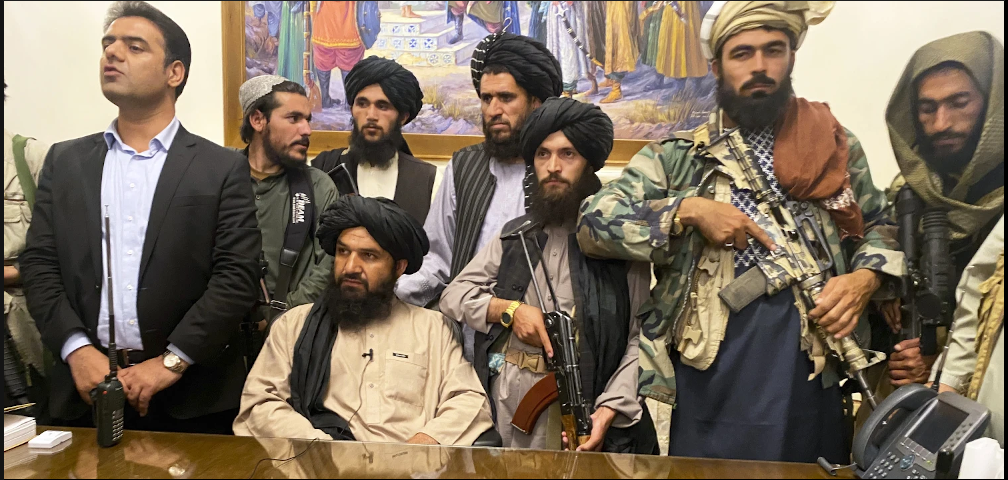Black Alliance for Peace Newsletter, August 18, 2021
Just days ago, some intelligence estimates figured it could take up to six months for the Taliban to seize control of Kabul in its sweeping campaign to reclaim power in Afghanistan. Yet, on Sunday, former President Ashraf Ghani formally resigned and fled the country. Now, Taliban officials reside in the presidential palace as they formalize their new government.
In just one week, the group captured dozens of provincial capitals and assumed control over borders shared with Iran and Tajikistan. The inevitability of this moment had been assured for weeks, but few could have predicted the rapid pace at which the U.S.-funded and -trained Afghan National Army would be defeated. Nevertheless, B-52 bombers and AC-130 gunships (courtesy of Boeing and Lockheed Martin, respectively) continued U.S. airstrikes last week. These planes have occupied the skies of Afghanistan for nearly 20 years. With one foot out the door, the United States and its NATO allies have maintained their shameless and criminal disregard for the Afghan people by growing the toll of death and destruction inflicted upon this nation since 2001.
Despite its withdrawal, the United States will not divert its gaze from Afghanistan. China and Russia are seeking to strengthen and expand their economic relationships across Central Asia. Maintaining U.S. hegemony in the region will require obstructing and undermining these relationships. Additionally, the United States has poured trillions of dollars into its half-century-long project of strangling Arab/Third World nationalism in its cradle, ranking widespread destabilization as a favored outcome in nations like Iraq, Iran, Syria and Yemen. The alternative would be a regional balance of power that threatens the dominance of U.S.-Israeli interests and interrupts the further accumulation of capital by the world’s foremost weapons manufacturers. That would imperil the very foundations of U.S. capitalism, imperialism and colonialism. The developments in Afghanistan may not alter Western objectives, but they will certainly influence them.
The latest reports from Washington indicate former mujahideen leader Gulbuddin Hekmatyar and former President Hamid Karzai, two known CIA assets, are among the people coordinating with the Taliban on the formation of a new government. The aspirations of the Afghan people for peace, democratic governance and national sovereignty undoubtedly will be cast aside as this coordination takes place. Meanwhile, neighboring nations are absorbing a mounting outflow of refugees as Afghanistan confronts the enduring social, economic and political crises the United States has left in its wake.
As far as accountability is concerned, the worst the United States will suffer internationally is criticism over the failure of its war and the mishandling of its withdrawal. But it will not experience a sanction of any kind for its innumerable criminal actions: The violation of Afghan sovereignty, the widespread use of torture, and the slaughter of tens of thousands of Afghan men, women and children. No reparations will be paid for the decades lost to war because of the lives lost; the myriad physical and psychological damage inflicted upon survivors; the destruction of homes, families, hospitals, schools and other infrastructure; and the toxic remains of two decades of bombings.
And while all eyes are on Afghanistan, the United States continues its other wars of aggression across the world, claiming to “fight terrorism”—the same excuse it used to invade Afghanistan 20 years ago. Biden recently authorized air strikes on Somalia, more U.S. Special Forces recently have moved into the Democratic Republic of Congo, and the United States is continuing its mission to further destabilize the Horn of Africa by pushing for so-called “humanitarian intervention” in Ethiopia. That country has been added to the nearly 40 that are under some form of deadly U.S. sanctions that deprive countries of food, fuel and medicine. Meanwhile, the United States remains entrenched in Iraq, reportedly expanding its Ain al-Asad base despite calls for its withdrawal. All this while it claims to be withdrawing its combat forces from Iraq. Over in Syria, the United States continues the destabilization effort, as well as stealing Syrian resources. Meanwhile, Haiti struggles to effectively respond to yet another natural disaster because of the more than a century’s worth of U.S./Western imperialist aggression.
While the United States claims to be ending its war on Afghanistan, U.S. wars never end until the empire controls a country’s resources or its geostrategic capabilities for the benefit of Western capital. Perhaps the latest developments in Afghanistan will inspire more resistance to U.S. occupation in Iraq, Syria and elsewhere around the world.
